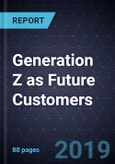Understandings of the Preferences and Trends of the New Customer Base
Generation Z currently makes up 24% of the global population and are set to have significant spending power. This "digitally native" population cohort, born between 1993 and 2007, will be an important customer base in the future. This age cohort is expected to be the most ethnically diverse and tolerant generation yet. It is also a socially and environmentally aware group. In the US, it is estimated that Gen Z has a direct spending power of US$29 billion-US$143 billion and an indirect spending power of US$600 billion. Companies that are tracking well with Gen Z are those that embrace authenticity and transparency. Gen Z does not like being ‘sold to’ and prefers brands that enable user-generated content and use social media influencers to do their marketing. For manufacturers, these characteristics will have far-reaching impacts. Brands will no longer be the focal point for a generation that is shaped by constant connectivity and ready access to information, and receptive to non-formal channels of communication. Gen Z customers will be more comfortable with the idea of autonomous technologies and robots, given that they are the first generation to be born in the Internet and technology era.
This research highlights Gen Z's demographic makeup, psychographic customer profile, and looks at successful brands that have responded to their particular aspirations and needs.
Key Features
- Gen Z will push brands to do better: for the environment, for their health, and for the common good.
- Companies that embrace authenticity and play a positive role in society will find that Gen Z customers will do much of their marketing for them.
- The future is mobile. Gen Z will continue to demand that services and products be available on a mobile platform. Social media as a direct platform for buying goods and services will grow in importance.
- Artificial intelligence and automation will create entirely new jobs and lead to a shift in work environments. Gen Z will need to have flexible skill sets to adapt to a fast-changing job market.
- Gen Z, with attention spans of 8 seconds, will need highly interventional engagement modes that leverage behavioral analytics and nudge tactics to ensure customer stickiness.
Key Issues Addressed
- What are the key characteristics of Generation Z and how do they differ from previous generations?
- Which are the key social, technological, economic, environmental, and political trends shaping Gen Z?
- Which emerging markets are the most important for targeting Gen Z customer?








